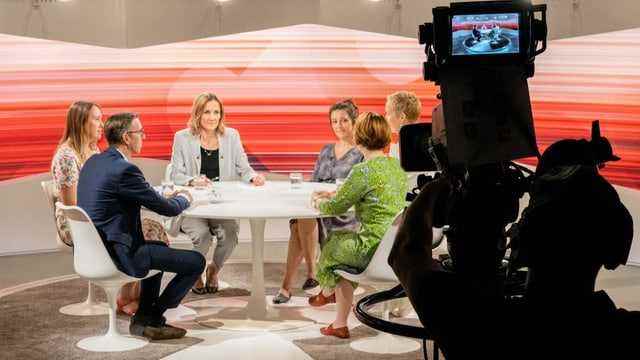Since the beginning of the war, Switzerland has taken in over 60,000 Ukrainian refugees. They receive protection status S and can therefore work immediately. Refugees from other war zones experience it differently: At the height of the Syrian war, for example, around half of the Syrian refugees were given “Temporary Admission” status. As a result, they are disadvantaged when it comes to family reunification or integration into the labor market.
Why this? Historian Francesca Falk classifies the differences compared to the SRF program “Club”.
SRF News: Francesca Falk, you say that there are big differences in how Switzerland takes in refugees – and that over the last few decades?
Francesca Falk: If you look at the present, you don’t have to be a historian to see that. But this phenomenon is not new. For example, during the Second World War people who fled Nazi Germany for political reasons were taken in in Switzerland. For Jewish refugees, on the other hand, the border was closed from 1942, although it was known that the mass extermination of the Jewish population was imminent.
Anti-Semitism played a crucial role.
The prevailing anti-Semitism played a decisive role. For example, Heinrich Rothmund, then head of the Federal Police for Foreigners, said: “We didn’t fight against Jewry for 20 years just to let it be imposed on us now.”
What is the decisive factor? The religion?
These people are credited with being “different”. In the case of the Jewish population, there was religion on the one hand, but also a very strong racial thinking: that the Jewish refugees could bring a different heritage with them and could “spoil” an entire people.
Such perceptions do not circulate by themselves, they are produced. In fascism there was a whole propaganda machine behind it, which worked towards the fact that the Jewish population was perceived as so different.
If we look at the present: six months before the start of the Ukraine war, the Taliban took power in Afghanistan. Did Switzerland react differently?
I find that surprising, because in Switzerland there is no sympathy for the Taliban. And yet these people were received very differently. From my point of view, this has to do with the strong anti-Muslim racism that exists in Switzerland.
The different reception of people from Afghanistan and Ukraine has to do with the strong anti-Muslim racism that exists in Switzerland.
That a distinction is made between “good”, Christian refugees from Europe and “threatening” refugees from the Middle East. This is of course very problematic.
Would you go so far as to say that our refugee and migration policy is racially charged?
I would say that historically you can see that it exists. And then I would differentiate between refugee policy at state level and society – and these very images and prejudices that circulate in society. Another example are the refugees from Sri Lanka. That was the first large group of non-white people to come to Switzerland in the 1980s. At that time, the media spread very strong prejudices, also in the form of fake news.
At that time, the media spread very strong prejudices, also in the form of fake news.
For example, it was rumored that some refugees wore expensive leather jackets, which shows that they are not dependent on help at all. That caused a scandal at the time. The jackets were defective productions that had been distributed to the refugees by the Red Cross. There were several attacks on asylum shelters. One killed four refugees, including two children.
The humanitarian tradition is often mentioned. Does Switzerland live up to this?
Switzerland has a long history of taking in refugees. But there is also the long history of non-admission. These two sides have always existed – and you can still see that today. On the one hand, we have this great, very nice solidarity with the Ukrainians. But there are also other refugees who would also be dependent on this solidarity and for whom the situation is very different.
The interview was conducted by Barbara Lüthi.
Francesca Falk was a guest on the second episode of the Club’s summer series War and Peace which aired on Tuesday 26th July.

